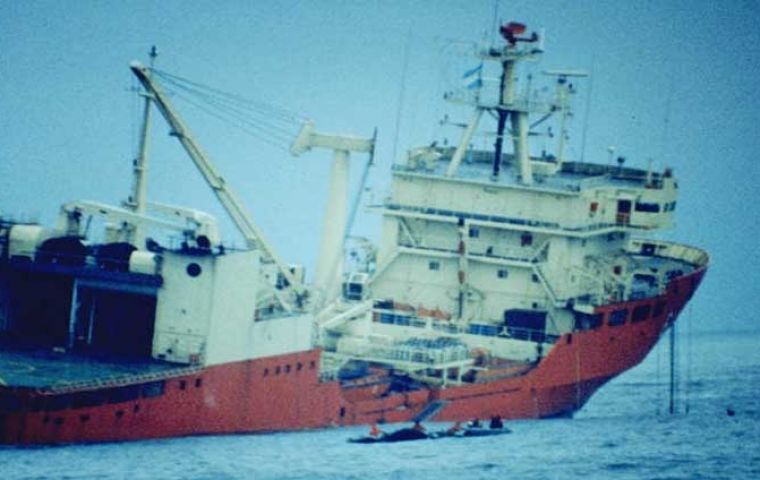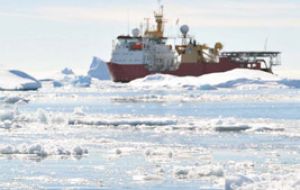MercoPress. South Atlantic News Agency
Britain and Argentina share stringent environmental duties in Antarctica
 The Argentine research vessel the MV Bahia Paraiso was lost in 1989 spilling 645.000 liters of diesel
The Argentine research vessel the MV Bahia Paraiso was lost in 1989 spilling 645.000 liters of diesel  Performing divers from HMS Protector, provided essential imagery of sights rarely seen by human eyes
Performing divers from HMS Protector, provided essential imagery of sights rarely seen by human eyes Divers from Royal Navy ice patrol ship HMS Protector have been exploring beneath the waves of the Antarctic to ensure stringent environmental guidelines are being followed in the region. In the process the diving team on board HMS Protector has been busy capturing rare underwater footage of the Antarctic.
Providing essential imagery of sights rarely seen by human eyes, the 4 Royal Navy divers braved the chilling temperatures to ensure environmental guidelines are being followed in the region - particularly in the case of the sunken Argentine research vessel the MV Bahia Paraiso.
When she ran aground in 1989 the ship spilled 645,000 liters of diesel and caused one of the worst marine environmental emergencies in Antarctica to date. However, a recent Argentine and Dutch team carefully removed all traces of fuel, with HMS Protector’s dive team tasked to ensure there was no further leakage.
Diving on the hull, and equipped with an underwater camera, the team were able to confirm that the diesel flow had ceased and also identified a rich ecosystem of hanging sponges and aquatic life.
Leading Diver Chris Hayes, the team leader said that diving in Antarctica is inconceivably amazing with diverse aquatic life and breathtaking sea bed topography.
“It is a real privilege to dive in the Antarctic; it certainly makes a change from diving in UK waters searching for unexploded Second World War ordnance or in the very warm waters of the Gulf”.
The team also explored the dormant water-filled caldera of the Deception Island volcano - which is one of only two in the world - and surfaced to a watching audience of penguins intrigued by their strange-looking visitors.
While this risk assessment included exiting safely if there was any sign of volcanic activity, the divers were also warned of the dangers of killer whales and leopard seals as they explored icebergs on the peninsula.
After confirming the icebergs were grounded rather than floating, the dive team jumped into the waters to examine the mass of ice underneath. The cold waters provide excellent visibility for this type of diving - around 15 meters or more, with the sea bed around the icebergs littered with whale bones, starfish and an array of rare fauna and flora.
HMS Protector, which is based in Portsmouth, is a 5.000-tonne ice patrol ship that is deployed on operations 330 days of the year. Her mission is to provide a UK sovereign presence in the British Antarctic Territory, South Georgia and the South Sandwich Islands and their surrounding maritime areas.
This includes underpinning their security and good governance, meeting the UK treaty obligations and exercising rights under the Antarctic treaty through inspections, hydrographical charting and support to scientific research.




Top Comments
Disclaimer & comment rules-

-

-

Read all commentswell i see a problem with this article already......Argentina.
Mar 12th, 2013 - 04:08 pm 0Nice to see Arg can work together with the dutchs in resolving environmental issues.
Mar 12th, 2013 - 05:44 pm 0@2
Mar 12th, 2013 - 06:49 pm 0........that Argentina caused!!
Commenting for this story is now closed.
If you have a Facebook account, become a fan and comment on our Facebook Page!